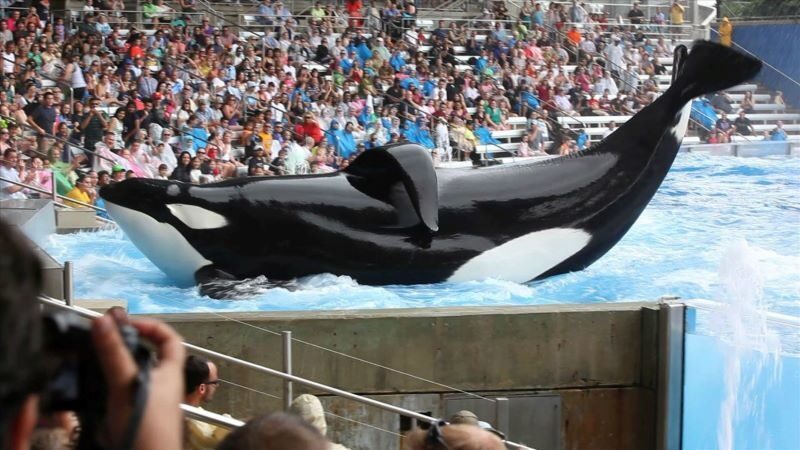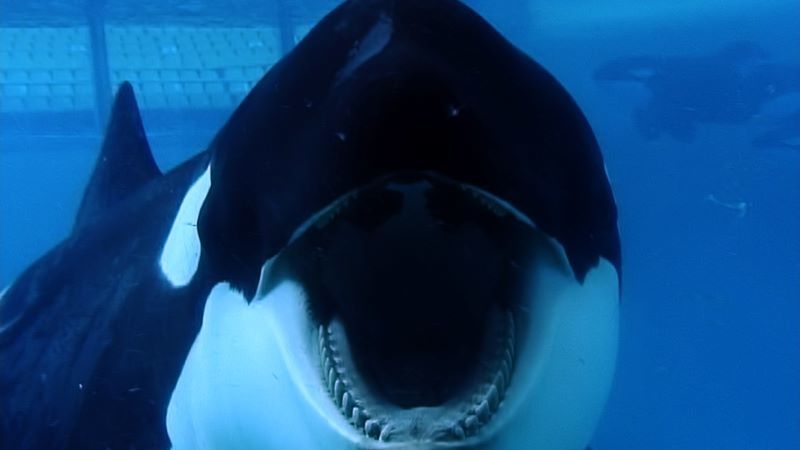An Artificial Killer (Whale)
Review of BLACKFISH, screened by Virtual SIFF Cinema
Written by TeenTix Newsroom Writer Eleanor Cenname and edited by Teen Editor Olivia Sun

Sometimes, we ignore the truth in favor of a more digestible alternative. After all, no one wanted to see the intense pain that turned a captive killer whale, Tilikum, into a violent being. For SeaWorld’s Tilikum, his pain was not only felt physically by a tiny cell that restricted him from swimming 40 miles a day, but also emotionally from unbearable loneliness. With Tilikum’s story as the focal point in a multifaceted depiction of the brutal sea-circus industry, Gabriela Cowperwaite’s documentary BLACKFISH leaves no room for ignorance.
Cowperwaite weaves a cohesive story from interviews, SeaWorld advertisements, archival footage, and 9-1-1 call recordings. This stark combination makes the SeaWorld advertisements more akin to propaganda. Coupled with the interviews, the advertisements are morose and gaudy. But of this footage, the most compelling is an interview with John Crowe, one of the men who captured young orcas and shipped them to sea-parks around the world. Crowe describes his participation in a brutal 1970 capture in the Salish Sea. While Tilikum was captured near Reykjavik, not in the Salish Sea, the message is the same. Crowe regretted his participation in the capture of the orcas because he saw their profound emotional connection to one another as well as grief from mothers who were taken from their young.

The interviews with former trainers at Sealand of the Pacific Park in British Columbia and SeaWorld, both parks that owned Tilikum, were similarly evocative. While the trainers clearly regretted their participation in the sea-circus industry, they also made a case for their own compliance: that Tilikum and the other captive orcas seemed happy…that is, until the female orcas Tilikum was confined with attacked him and Tilikum began killing people. First, Tilikum killed trainer Keltie Bryne at Sealand; then, after SeaWorld bought him, Tilikum killed trespasser Daniel Dukes and trainer Dawn Brancheau. After studying orca brains, neurologists found that orcas have a part of the brain that humans do not: a piece that processes emotions and develops a keen sense of self. Her interview provided the important context that, in the wild, they do not hurt humans or each other. In fact, orcas form matriarchal families that are profoundly loyal. Tilikum’s behavior was not normal. It was the result of his suffering. It was desperate.
It is this crafting a story from different perspectives that makes BLACKFISH so compelling, but sometimes hard to follow. The underlying story, while powerful and emotionally raw, is sometimes muddled by the many tangents included in the documentary. Many of the interviewees included personal asides that distracted from the story. Experts and trainers alike shared stories that were not about Tilikum, but were simply about the suffering inflicted upon the orcas. For example, when a calf born in captivity was taken from her mother, the mother used long-range calls to try to call her daughter back to her. Of course, the mother’s calls were futile. Indeed, context is necessary and these asides can add to the catharsis that defines the documentary, but in excess, they confuse an already complex narrative.

However, in terms of its emotional impact, BLACKFISH is a powerhouse. The documentary thoroughly highlights the many voices and perspectives involved in orca captivity. Four years after BLACKFISH's debut in 2013, Tilikum died at 35. Since then, the sea-circus industry has faced even more criticism. Advocates have demanded the release of one of the oldest living captive orcas, Tokitae, back into her natal waters, the Salish Sea. SeaWorld has also since agreed to stop breeding killer whales.
Yet still, Tilikum’s narrative is dense and unsettling. It should be. BLACKFISH depicts unquestionable cruelty and leaves no question in the viewer’s mind: this is wrong.
BLACKFISH was screened through Virtual SIFF Cinema, May 29-June 4. For event information see here.
Lead photo caption: Tilikum in a scene from BLACKFISH, a Magnolia Pictures release. Photo courtesy of Magnolia Pictures.
The TeenTix Newsroom is a group of teen writers led by the Teen Editorial Staff. For each review, Newsroom writers work individually with a teen editor to polish their writing for publication. The Teen Editorial Staff is made up of 6 teens who curate the review portion of the TeenTix blog. More information about the Teen Editorial Staff can be found HERE.
The TeenTix Press Corps promotes critical thinking, communication, and information literacy through criticism and journalism practice for teens. For more information about the Press Corps program see HERE.


